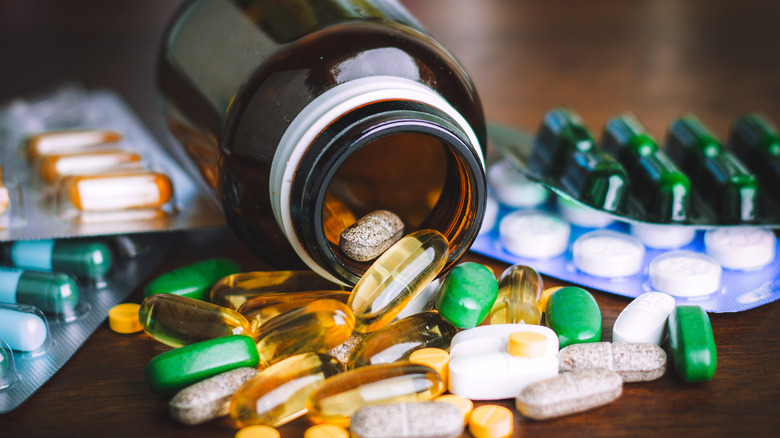Sneaky Causes Of High Cholesterol That May Surprise You
About 94 million Americans over the age of 20 have hypercholesterolemia, or high cholesterol, reports the Centers for Disease Control and Prevention (CDC). The condition also affects children and teens, increasing their risk of developing cardiovascular problems later in life, warns WebMD. This waxy substance can cause plaque buildup on the artery walls and affect blood flow to the heart and other vital organs. Over time, it may contribute to heart disease, stroke, and premature death.
However, not all cholesterol is harmful. High-density lipoprotein (HDL), the "good" cholesterol, actually helps your body break down and eliminate low-density lipoprotein (LDL), or "bad" cholesterol, explains the American Heart Association (AHA). HDL also exhibits antioxidant and anti-inflammatory properties and may protect against atherosclerosis, or plaque buildup in the arteries, according to 2013 research published in the journal Arteriosclerosis, Thrombosis, and Vascular Biology. High levels of LDL, on the other hand, can put you at risk for cardiovascular events, says AHA.
Generally, adults should have total cholesterol levels between 125 and 200 milligrams per deciliter (mg/dL) and LDL cholesterol levels below 100 mg/dL, notes the National Library of Medicine. These numbers can go up or down, depending on your age, body weight, and lifestyle factors such as your diet and exercise habits. Saturated fat can definitely raise your cholesterol levels, but it's not the only culprit. With that in mind, here are some sneaky causes of high cholesterol that may surprise you.
Chronic stress
Chronic stress affects nearly every aspect of the body, including your brain, heart, lungs, stomach, and muscles. Over time, it may increase blood pressure and contribute to heart disease, notes the American Psychological Association. A lesser-known side effect of prolonged or chronic stress is elevated cholesterol, according to a 2017 research paper published in Medicine. As it turns out, this lifestyle factor can increase LDL and triglyceride levels while reducing HDL cholesterol. If left unaddressed, it may lead to cardiovascular problems, diabetes, and lipid disorders.
Researchers don't fully understand the relationship between stress and high cholesterol, but several theories exist. A possible explanation is that acute stress causes the blood to become more concentrated, which may temporarily increase cholesterol levels, reports a 2002 study featured in Psychosomatic Medicine. Chronic stress, on the other hand, can trigger food cravings and stimulate appetite, leading to weight gain, says Harvard Medical School. If you reach for cookies, pizza, and other comfort foods when you're stressed out, your cholesterol levels may go up.
Last but not least, chronic stress promotes inflammation, which may increase the risk of hypercholesterolemia in people with diseases affected by stress, according to 2017 research published in the Frontiers in Human Neuroscience. On the positive side, it's possible to manage stress through yoga, meditation, breathing exercises, and lifestyle changes. Regular exercise can help, too, as it calms the mind and may improve blood lipids, including cholesterol levels, explains Harvard Medical School.
Certain medications
Most medications carry side effects, and some drugs can skyrocket your cholesterol levels. The most common offenders are steroids, beta-blockers, diuretics, and retinoids, says Everyday Health. Also, some birth control pills contain progestin, a synthetic hormone that may decrease HDL and raise LDL cholesterol levels. Protease inhibitors, anabolic steroids, immunosuppressants, and synthetic growth hormones may increase cholesterol levels too, notes a 2018 review published in Endotext.
For example, some anabolic steroids can raise LDL cholesterol by up to 20% and decrease HDL cholesterol levels by 20 to 70%. Retinoids, a class of drugs prescribed for acne and other skin disorders, may elevate triglyceride levels and can result in pancreatitis, according to the above review. A 2018 study in the Journal of Family Medicine and Primary Care found that even low doses of Accutane, or isotretinoin, raised LDL cholesterol in 5% of patients after just three months of treatment. Some medications, especially beta-blockers, diuretics, and corticosteroids, can also increase triglyceride levels, putting you at risk for metabolic syndrome, pancreatitis, heart attack, stroke, and vascular diseases, warns the Cleveland Clinic.
Liver problems
High cholesterol tends to be more common in people with liver problems, such as nonalcoholic fatty liver disease (NAFLD). Your liver makes cholesterol, regulates its levels in the body, and removes the excess. NAFLD and other disorders that affect liver function can interfere with this process, leading to hypercholesterolemia, explains Healthline. For example, chronic cholestatic liver disease can impair the liver's ability to transport bile acids to the intestines. Over time, this condition may increase LDL cholesterol levels in some patients, contributing to heart disease, according to clinical research published in Current Treatment Options in Gastroenterology.
Liver disease may have no symptoms in its initial stages, warns Healthline. However, in some cases, it may cause poor appetite, yellowing of the skin and eyes, weakness, tiredness, and fluid buildup in the abdominal cavity. If your doctor suspects you have liver problems, they may order a couple of blood tests to determine the cause. After that, you may need to take medications and change your diet.
Remember that prevention is better than treatment. Small things, such as limiting alcohol and saturated fat, and losing excess weight, can lower your risk of liver disease, according to the American Liver Foundation. They also recommend engaging in regular exercise and quitting smoking. Make sure your diet includes plenty of fiber and healthy fats, such as those found in salmon, tuna, almonds, and olive oil.
Low-carb, high-fat diets
Obesity is a contributing factor to high cholesterol and other lipid disorders, according to 2013 research published in the journal Nutrients. Given this aspect, going on a diet would seem to make sense to lose the extra weight. But some diets can do more harm than good. For example, the ketogenic diet may help you get leaner, but it can affect liver and kidney function, among other side effects. "We don't know if it works in the long term, nor whether it's safe," dietician Kathy McManus told Harvard Medical School.
Ketogenic diets are high in fat and low in carbs, making it easier to achieve ketosis, a metabolic state where your body burns fat instead of sugar for energy. The problem is that eating too much fat — especially saturated fat — can raise your LDL cholesterol levels, suggests a recent study featured in the journal Nutrients. These changes in blood lipids can last for months, said cardiologist Neel Chokshi in an interview with Penn Medicine. He explains that most people "see the weight loss and feel better" while on a ketogenic diet, but that little is known about its long-term effects.
The Academy of Nutrition and Dietetics warns that ketogenic diets may not be safe for those with pancreatic disorders, liver or thyroid problems, or gallbladder issues. Over time, this eating pattern can result in nutrient deficiencies, kidney stones, or heart disease. Plus, it may cause constipation and other side effects, such as the so-called keto flu.
Lack of exercise
Most people associate high cholesterol with poor nutrition, but that's not always the case. Sometimes, this problem is due to a sedentary lifestyle, says the Cleveland Clinic. Regular exercise boosts "good" cholesterol and reduces LDL cholesterol levels, leading to improved cardiovascular health. At the same time, it facilitates weight loss, which can further lower "bad" cholesterol. Clinical evidence suggests that LDL decreases by about 0.8 mg/dL for every kilogram (2.2 pounds) of weight lost, reports the journal Lipids in Health and Disease.
Aerobic exercise is particularly beneficial, suggests a 2014 review published in Sports Medicine. Researchers found that on average, cardiovascular training can lower LDL cholesterol by 5% or more and triglycerides by up to 4% in just three months. Intense aerobic workouts and low-to-moderate intensity strength training may produce even greater improvements. In one study, total cholesterol decreased from 203 to 186 mg/dL in subjects who incorporated strength exercises into circuit training for two months, notes the above review.
As you can see, high cholesterol isn't necessarily related to your diet. Sometimes, it may be due to a sedentary lifestyle, certain medications, or chronic stress. Diabetes, hypothyroidism, pregnancy, menopause, and aging may play a role too, explains Heart UK. The best thing you can do, states the National Library of Medicine, is check your cholesterol levels regularly and commit to a healthy lifestyle. Cut back on saturated and trans fats, limit added sugar, and engage in regular exercise to keep your heart in shape.






